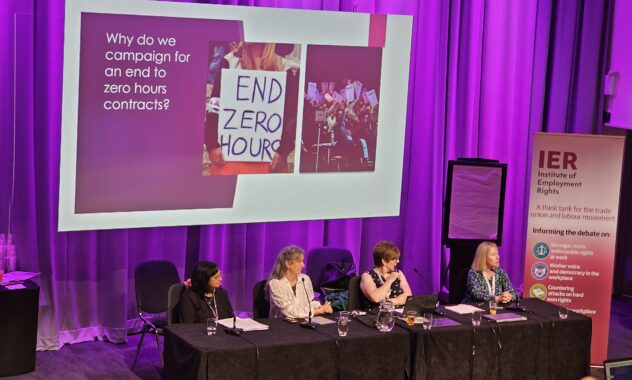Union dismay over pay recommendation as IER expert questions the independence of the Pay Review Body process
ASCL, NAHT, NASUWT and NEU write to Education Secretary Bridget Phillipson outlining concerns over pay recommendation.

The issue of Pay Review Bodies (PRBs) has been put firmly in the spotlight again, with the Labour government declaring that a 2.8% teacher pay rise “would be appropriate” for 2025-26 in their pay recommendation to the Department for Education’s evidence submission to the School Teachers’ Review Body (STRB). The move has sparked criticism from teaching unions and highlighted the role of PRBs, bringing into question the independence of the process.
Four education unions – ASCL, NAHT, NASUWT and NEU – have written to Education Secretary Bridget Phillipson to outline their concerns.
The Institute of Employment Rights (IER) has facilitated a number of discussions about PRBs over recent years, and in August 2024, Dr Andrew Moretta, on behalf of the IER, wrote an important amd well-received report, ‘Pay Review Bodies: their past and future’, drawing the strands together of these debates, while placing the issue in it’s historical context.
Dr Andrew Moretta argued that Labour had reneged on it’s commitment to an independent process, saying:
“In the opening paragraph of the government’s December 2024 Economic Evidence to the PRBs it is stated that ‘The government is committed to the independent Pay Review Body (PRB) process as the means for setting pay for frontline public sector workers and is acting to restore confidence in this process.’
The reality is that the UK PRB regime is on the verge of being terminally undermined. There is little evidence of any commitment to implementing an effective PRB process. The UK’s Iabour treaty obligations dictate that PRB mechanisms be deployed only to compensate public servants unable to bargain effectively with the Government through a trade union. A PRB should be truly independent and impartial, its recommendations treated effectively as awards to be implemented in all but the most extreme economic circumstances. That is their role in a healthy democracy – that is how they should work.
However, in recent decades PRBs have had their independence compromised and their coverage extended, supplanting rather than complementing collective bargaining mechanisms. As tools of austerity, rather than serving the workers whose terms and conditions of employment were at issue, the PRB regime served the Tory anti-trade union agenda by augmenting the damage caused by the laws against strikes to further reduce collective agreement coverage and permit the imposition of very considerable reductions in real terms pay.
The very disappointing news that the new government will continue to regard PRB recommendations as mere ‘advice’ to the Cabinet and the effective imposition of a 2.8% cap on such recommendations tells us that the Labour government is set to make the same mistakes as its Tory predecessors. Rather than restoring confidence by instituting root and branch reform of the PRBs serving sectors genuinely unable to bargain collectively and by providing negotiating machinery to enable those public servants both able and willing to engage in effective collective bargaining to do so, the Government is continuing to use the PRB regime as a tool to impose real terms public spending cuts. The result will be further wholly unnecessary strikes. Reeves and Starmer should heed the advice they offered to the hapless Sunak administration during the rash of public sector strikes during 2022-23, and ‘sit down and negotiate’ with the public sector unions with a view to restoring the real terms pay losses of the last 14 years.”
Today, four education unions – ASCL, NAHT, NASUWT and NEU – have written to the Secretary of State, Bridget Phillipson, outlining their concerns about the inadequate and underfunded pay recommendation outlined in the Department for Education’s evidence submission to the School Teachers’ Review Body, published on 10 December.
The text of the letter is as follows:
“Dear Secretary of State,
Teacher and school leader pay
We are writing to you jointly to express our concern over your evidence to the School Teachers’ Review Body for the 2025-26 pay award. We strongly feel that the proposals set out in your submission would further damage teacher recruitment and retention in England, and lead to more school cuts.
The unions have been clear that the 5.5% September 2024 pay increase must be only the first in a series of fully funded, above inflation pay increases needed to correct teacher and school leader pay. The value of teacher and school leader pay has been cut by over a fifth against RPI inflation since 2010, even after taking account of the above-inflation September 2024 increase. Our submissions to the STRB set out the overwhelming evidence on the impact of the pay cuts on living standards and on the competitiveness of teacher and school leader pay.
We were therefore deeply disappointed to see that in your evidence to the STRB you propose a pay increase of just 2.8% for teachers and school leaders in September 2025. Current predictions for RPI inflation from the OBR show that such an increase is likely to represent yet another real terms pay cut. Anticipated pay growth in the wider economy next year means that it is also likely to represent a further hit to the competitiveness of teacher and school leader pay.
Your letter to the education workforce (1) set out the Government’s aim to build a fairer society and to deliver the best life chances for every child. You also reiterated the Government’s commitment to recruiting 6,500 new teachers. In your remit letter to the STRB, you set out a commitment to “supporting teachers to stay in the profession and thrive” and to raising the status of the profession.
All of these objectives will be undermined if the Government continues with the failed Conservative policy of cutting or failing to restore teacher and school leader pay.
Alongside excessive workload, the pay cuts have contributed to the recruitment and retention crisis that is doing such damage to our education service. Recruitment targets are being missed by huge margins and we are losing many experienced teachers and school leaders. Teacher shortages across the school system are damaging pupils’ life chances.
The recruitment and retention crisis will not be solved until and unless the Government provides the investment needed to properly value, recruit and retain teachers and school leaders. Pay cuts are the ultimate false economy, because they guarantee the continuation of severe teacher and school leader shortages and undermine the crucial role of our education service in economic prosperity.
In your letter to the STRB, you accepted that most schools will not be able to fund the pay award of teachers without making “efficiencies.” Senior leaders already go through a rigorous process of examining every budget line every year, and the reality is that any further “efficiencies” are likely to equate to cuts to provision.
The recent DfE report (2) looking at school finances, found that just 3% of primary schools and 6% of secondary schools described themselves as “financially secure.” The report showed that schools had responded to financial pressure by not replacing staff; reduced hours for teaching and support staff; appointing Early Career Teachers whenever possible; teachers returning to maximum class teaching allocations and middle and senior leadership team restructures. Forcing schools further down this road will reduce the quality of education; increase teachers’ workload and further add to the difficulties with staff recruitment and retention. We are further concerned that the publication of your proposals will result in schools making premature decisions that could adversely affect the jobs of teachers and support staff and provision for pupils.
The Government must not cut schools’ spending power any further because after 14 years of austerity – England now has the largest class sizes in Europe, the highest secondary class sizes on record and more than a million pupils taught in classes of more than 30.
We recognise that decisions on public spending are collective Government decisions and we would value the opportunity to discuss with you further how we might work with you to make the case for education to the Treasury and the Prime Minister. We are committed to working in collaboration with the Government to achieve the best possible outcomes for children and young people and we very much hope that we can find a solution to the issues highlighted in this letter.
Yours sincerely,
Daniel Kebede, General Secretary, NEU
Dr Patrick Roach, General Secretary, NASUWT
Pepe Di’Iasio, General Secretary, ASCL
Paul Whiteman, General Secretary, NAHT”
Notes:
1) Letter to the education workforce from Education Secretary Bridget Phillipson – The Education Hub
2) DfE, Schools’ responses to financial pressures 2023, November 2024
You can read Dr Andrew Moretta’s report on Pay Review Bodies here.







